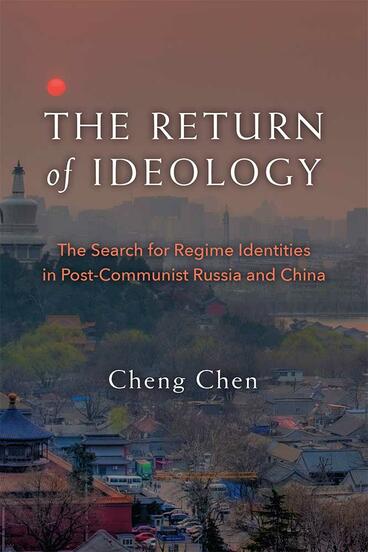The Return of Ideology
The Search for Regime Identities in Postcommunist Russia and China
As Russia and China leave communism behind, they struggle to forge a new political ideology for a new era
Description
As a nation makes the transition from communism to democracy or another form of authoritarianism, its regime must construct not only new political institutions, but also a new political ideology that can guide policy and provide a sense of mission. The new ideology is crucial for legitimacy at home and abroad, as well as the regime’s long-term viability. In The Return of Ideology, Cheng Chen compares post-communist regimes, with a focus on Russia under Putin and post-Deng China, investigating the factors that affect the success of an ideology-building project and identifies the implications for international affairs.
Successful ideology-building requires two necessary—but not sufficient—conditions. The regime must establish a coherent ideological repertoire that takes into account the nation’s ideological heritage and fresh surges of nationalism. Also, the regime must attract and maintain a strong commitment to the emerging ideology among the political elite.
Drawing on rich primary sources, including interviews, surveys, political speeches, writings of political leaders, and a variety of publications, Chen identifies the major obstacles to ideology-building in modern Russia and China and assesses their respective long-term prospects. Whereas creating a new regime ideology has been a protracted and difficult process in China, it has been even more so in Russia. The ability to forge an ideology is not merely a domestic concern for these two nations, but a matter of international import as these two great powers move to assert and extend their influence in the world.
Cheng Chen is Associate Professor of Political Science at the University at Albany, State University of New York.
Reviews
“In clear and compelling prose, and with a novel comparative approach that spans post-communist Central and Eastern Europe, Yeltsin’s Russia, Putin’s Russia, and post-Deng China, Chen sheds new light on the changing—and perhaps destabilizing— regime ideologies and foreign policies of contemporary Russia and China. An original and thought-provoking read. ”
—Teresa Wright, California State University, Long Beach
"Chen offers a refreshing take on the complexity of non-liberal regimes and their attempts to offer an alternative to the prevailing Western ethic of democracy and capitalism."
- N Sackeyfio
--Choice Reviews
"In this impressive book, Cheng Chen has provided a robust definition which she has applied in a consistent and illuminating manner to compare ideological developments in post-communist Russia and China."
- Slavic Review
--Slavic Review
"A solid, well-researched, and timely book. It provides a valuable basic background to political developments in post-Soviet Russia and post-Deng China, and identifies both differences and similarities in the political trajectory of the two great powers."
- Nationalities Papers - Journal of Nationalism and Ethnicity
--Nationalities Papers - Journal of Nationalism and Ethnicity
"Stands out and makes an important contribution to this still growing body of literature. In this excellent study, Cheng Chen focuses on ideology, a subject that has been unduly understudied in the literature."
- Pacific Affairs
--Pacific Affairs

